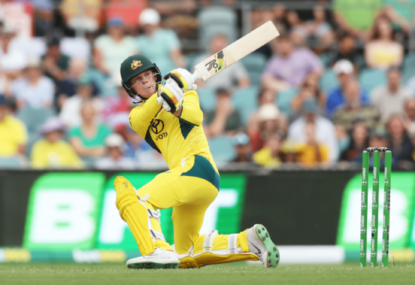It’s hard to be too critical of the Australian selectors for investing in youth after years of hanging on to fading veterans without refreshing the national squads.

But there comes a point in time where they are doing more harm than good by persisting with Jake Fraser-McGurk at international level when he clearly is not ready.
There was all sorts of hyperbole about the hard-hitting opener last summer when he cracked a 29-ball ton for South Australia in a one-dayer and was fast-tracked into the national white-ball sides.
The time was right. Give the young gun a chance to fire.
Give him time to settle in, get used to the higher quality bowling attacks that you’re confronted with at the top rather than a Tasmanian attack on a placid batting paradise like Karen Rolton Oval.
Unlike previous selection panels which churned and burned several prospects by playing them too early and then casting them back into the domestic wilderness (which could be viewed as an oxymoron but you get the gist).
The likes of Sam Heazlett, Joel Paris and Hilton Cartwright wore the green and gold after rapid rises early in their careers but were never seen again in the international arena after brief flirtations.
In an unusual way, Fraser-McGurk had a chance to break the shackles of his streak of fast starts coming undone quickly when Australia’s T20I against Pakistan on Thursday night at the Gabba was slashed back to just seven overs each.
These are the kind of “nothing to lose” slogfests in which a batter can blast their way back into form.
But for JFM, he continued his trend of a couple of classy shots which found the boundary then another attacking stroke which went straight to a fielder.
Glenn Maxwell, who went cheaply in each of the three ODIs last week, was the player who cashed in on the unusual circumstances in the Queensland capital to blast 43 at a strike rate greater than 200.

Jake Fraser-McGurk after being dismissed by Pakistan’s Naseem Shah. (Photo by Paul Kane/Getty Images)
The selectors are clearly hoping Fraser-McGurk will come good like Maxwell did.
Like basketballers who shoot their way out of a slump, power hitters in cricket’s short formats don’t really have another option with their make or miss style.
No one should expect Fraser-McGurk to ever be a consistent run-getter at the top of the order, particularly in the T20 format. He’s a luxury item in any side he’s in – he will often go cheaply but the reward will be when he gets going and keeps going.
Even when he’s in top form, it’s unlikely he will ever string a streak of five or more big scores in a row.
But judging by his early returns, the balance is way off with just two decent knocks from the 22-year-old’s first 10 for Australia.
In five ODIs, he’s scored 10, 41, 16, 13 and seven with only one of those brief knocks at less than a run a ball.
T20 wise and it’s a similar tale – duck, 16, duck, 50 and nine.
Last summer Ponting said Fraser-McGurk had as much talent as David Warner did when he was breaking into the Australian ranks.
Ponting thinks JFM “can turn out to be a three-format player for Australia” which seems a little far-fetched considering he can’t make South Australia’s Sheffield Shield XI at the moment due to his first-class average plummeting to 18.96 from 16 matches.
When the Australians play their full-strength line-up, Fraser-McGurk is not in either white-ball team with top-order duo Mitchell Marsh and Travis Head sitting out these six Pakistan fixtures.
Heading into the second T20I at the Sydney Cricket Ground on Saturday night, the selectors could very well keep Fraser-McGurk at opener in the belief that he will eventually find the middle without finding a fielder long enough to make an impact.
The Aussies are up 1-0 in the three-match affair and let’s face it, no heads will roll even if they do capitulate in the T20 series like last week’s ODI collapse.
Josh Phillipe, after switching to NSW from WA in the off-season, is in form at state level and waiting in the wings so the selectors would be better served giving a player with 15 appearances for Australia another run rather than crossing their fingers on Fraser-McGurk.
There could be a pay-off in the long run if Fraser-McGurk is made to go back to the domestic ranks to prove he is deserving of another shot at the international level rather than continually handing it to him when he is not performing anywhere near up to scratch.



